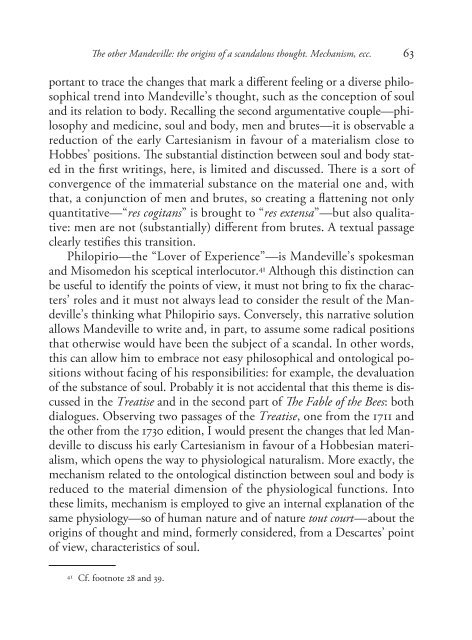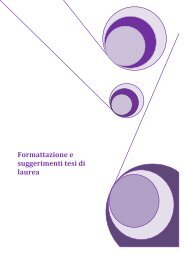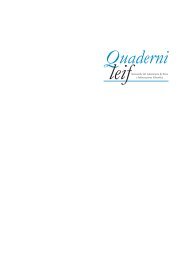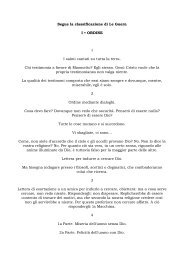qui - maria vita romeo
qui - maria vita romeo
qui - maria vita romeo
Create successful ePaper yourself
Turn your PDF publications into a flip-book with our unique Google optimized e-Paper software.
e other Mandeville: the origins of a scandalous thought. Mechanism, ecc. 63<br />
portant to trace the changes that mark a different feeling or a diverse philosophical<br />
trend into Mandeville’s thought, such as the conception of soul<br />
and its relation to body. Recalling the second argumentative couple—philosophy<br />
and medicine, soul and body, men and brutes—it is observable a<br />
reduction of the early Cartesianism in favour of a materialism close to<br />
Hobbes’ positions. e substantial distinction between soul and body stated<br />
in the first writings, here, is limited and discussed. ere is a sort of<br />
convergence of the immaterial substance on the material one and, with<br />
that, a conjunction of men and brutes, so creating a flattening not only<br />
quantitative—“res cogitans” is brought to “res extensa”—but also qualitative:<br />
men are not (substantially) different from brutes. A textual passage<br />
clearly testifies this transition.<br />
Philopirio—the “Lover of Experience”—is Mandeville’s spokesman<br />
and Misomedon his sceptical interlocutor. 41 Although this distinction can<br />
be useful to identify the points of view, it must not bring to fix the characters’<br />
roles and it must not always lead to consider the result of the Mandeville’s<br />
thinking what Philopirio says. Conversely, this narrative solution<br />
allows Mandeville to write and, in part, to assume some radical positions<br />
that otherwise would have been the subject of a scandal. In other words,<br />
this can allow him to embrace not easy philosophical and ontological positions<br />
without facing of his responsibilities: for example, the devaluation<br />
of the substance of soul. Probably it is not accidental that this theme is discussed<br />
in the Treatise and in the second part of e Fable of the Bees: both<br />
dialogues. Observing two passages of the Treatise, one from the 1711 and<br />
the other from the 1730 edition, I would present the changes that led Mandeville<br />
to discuss his early Cartesianism in favour of a Hobbesian materialism,<br />
which opens the way to physiological naturalism. More exactly, the<br />
mechanism related to the ontological distinction between soul and body is<br />
reduced to the material dimension of the physiological functions. Into<br />
these limits, mechanism is employed to give an internal explanation of the<br />
same physiology—so of human nature and of nature tout court—about the<br />
origins of thought and mind, formerly considered, from a Descartes’ point<br />
of view, characteristics of soul.<br />
41 Cf. footnote 28 and 39.








